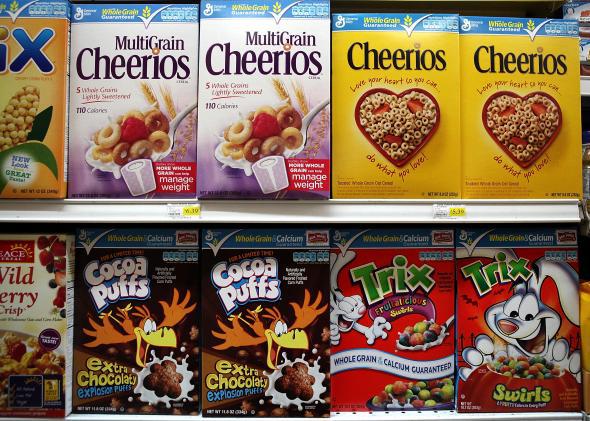Colorful, sickly sweet Lucky Charms have been a hit with kids ever since their introduction in the 1960s. They’ve been derided for their unhealthiness and high artificial content for just as long.
Those marshmallows could now get a lot less objectionable. General Mills—the company that makes Lucky Charms, as well as cereals like Trix, Reese’s Puffs, Cocoa Puffs, and Wheaties—announced today that it will eliminate artificial colors and flavors from all its cereals, replacing them with fruit and vegetable juices, natural dyes, and spice blends. Three-fifths of the company’s cereals already meet this standard, and the company says it will strip artificial colors and flavors from the rest by the end of 2017.
General Mills’ announcement comes at a time when major food companies are updating their products to reflect changing consumer attitudes. Nestlé announced in February that it would remove artificial flavors and colors from several of its candy bars and chocolates, and Panera, Taco Bell, and Pizza Hut have unveiled similar initiatives. Chipotle made the notable decision to drop genetically modified organisms from its menu last month. Two factors seem to incentivize these changes: heaps of media attention, and hopefully an attendant boost in sales. The latter certainly applies to General Mills, which has seen its cereal sales lag in the past few years as more people turn toward other breakfast options, such as yogurt.
But even if cutting artificial cereals is an economically motivated move, it has huge implications elsewhere. General Mills makes up about 30 percent of U.S. cereal sales—a market that includes a lot more young children than most. General Mills is the first cereal-maker to reject artificial ingredients, and doing so could pressure other companies—especially Kellogg, the company’s biggest rival—to do so, as well. After 2017, it’s not crazy to imagine an entire generation of children growing up with a whole lot less artificial flavoring in one of their staple breakfast foods.
And that would be huge. Artificial food coloring has been linked to cancer, allergic reactions, and hyperactivity and other behavioral problems in children. Whatever its motivations, General Mills’ move to drop artificial colors and flavors from its cereals promises to make the day’s most important meal at least a little bit healthier.
